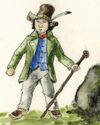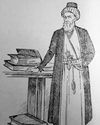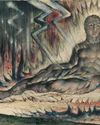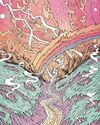The How & Why Of Consciousness
Philosophy Now
|December 2023 / January 2024
Raymond Tallis says the mysteries haven't been solved.

Of the many mysteries in which our existence is wrapped, three seem especially resistant to being transformed into soluble problems: why there is something rather than nothing (the origin of stuff); how the material world gave rise to organisms (the origin of living stuff); and how organic life came to be aware of itself and its surroundings (the origin of conscious stuff).
Physicists, who routinely go, even dance, where others fear to tread, sometimes imagine they have an answer to the first mystery. According to Lawrence Krauss in A Universe from Nothing (2012), the universe may have arisen out of nothing in virtue of an instability in the quantum vacuum that somehow delivers a preponderance of stuff over antistuff. This seems closer to creative accounting than a plausible creation story.
As for the second mystery – the emergence of living stuff in a dead world – a succession of theories, and numerous experiments replicating the conditions prevailing when life is thought to have begun, have brought us no closer to a coherent story of the origin of organisms. Yes, we can propose plausible mechanisms as to how molecules associated with life, such as carbohydrates, nucleic acids, and proteins, might have arisen. What is not at all clear is how these could have generated the dialectic between relatively stable structures and the interactions necessary to maintain those structures seen in the most elementary organisms. (For a discussion of this, see my piece ‘The Soup and the Scaffolding’, Philosophy Now, Issue 83.)
このストーリーは、Philosophy Now の December 2023 / January 2024 版からのものです。
Magzter GOLD を購読すると、厳選された何千ものプレミアム記事や、10,000 以上の雑誌や新聞にアクセスできます。
すでに購読者ですか? サインイン
Philosophy Now からのその他のストーリー

Philosophy Now
Bilbo Theorizes About Wellbeing
Eric Comerford overhears Bilbo and Gandalf discussing happiness.
9 mins
December 2025 / January 2026

Philosophy Now
What Women?
Marcia Yudkin remembers almost choking at Cornell
11 mins
December 2025 / January 2026

Philosophy Now
Islamic Philosophers On Tyranny
Amir Ali Maleki looks at tyranny from an Islamic perspective.
4 mins
December 2025 / January 2026

Philosophy Now
Peter Singer
The controversial Australian philosopher defends the right to choose to die on utilitarian grounds
5 mins
December 2025 / January 2026

Philosophy Now
Another Conversation with Martin Heidegger?
Raymond Tallis talks about communication problems.
7 mins
December 2025 / January 2026

Philosophy Now
Letters
When inspiration strikes, don't bottle it up. Email me at rick.lewis@philosophynow.org Keep them short and keep them coming!
17 mins
December 2025 / January 2026

Philosophy Now
The Philosophy of William Blake
Mark Vernon looks at the imaginative thinking of an imaginative artist.
9 mins
December 2025 / January 2026

Philosophy Now
Philosophical Haiku
Peering through life’s lens God in nature is deduced: The joy of being.
1 mins
December 2025 / January 2026

Philosophy Now
Philosophy Shorts
More songs about Buildings and Food' was the title of a 1978 album by the rock band Talking Heads. It was about all the things rock stars normally don't sing about. Pop songs are usually about variations on the theme of love; tracks like Rose Royce's 1976 hit 'Car Wash' are the exception. Philosophers, likewise, tend to have a narrow focus on epistemology, metaphysics and trifles like the meaning of life. But occasionally great minds stray from their turf and write about other matters, for example buildings (Martin Heidegger), food (Hobbes), tomato juice (Robert Nozick), and the weather (Lucretius and Aristotle). This series of Shorts is about these unfamiliar themes; about the things philosophers also write about.
2 mins
December 2025 / January 2026

Philosophy Now
Hedonic Treadmills in the Vale of Tears
Michael Gracey looks at how philosophers have pursued happiness.
8 mins
December 2025 / January 2026
Translate
Change font size

